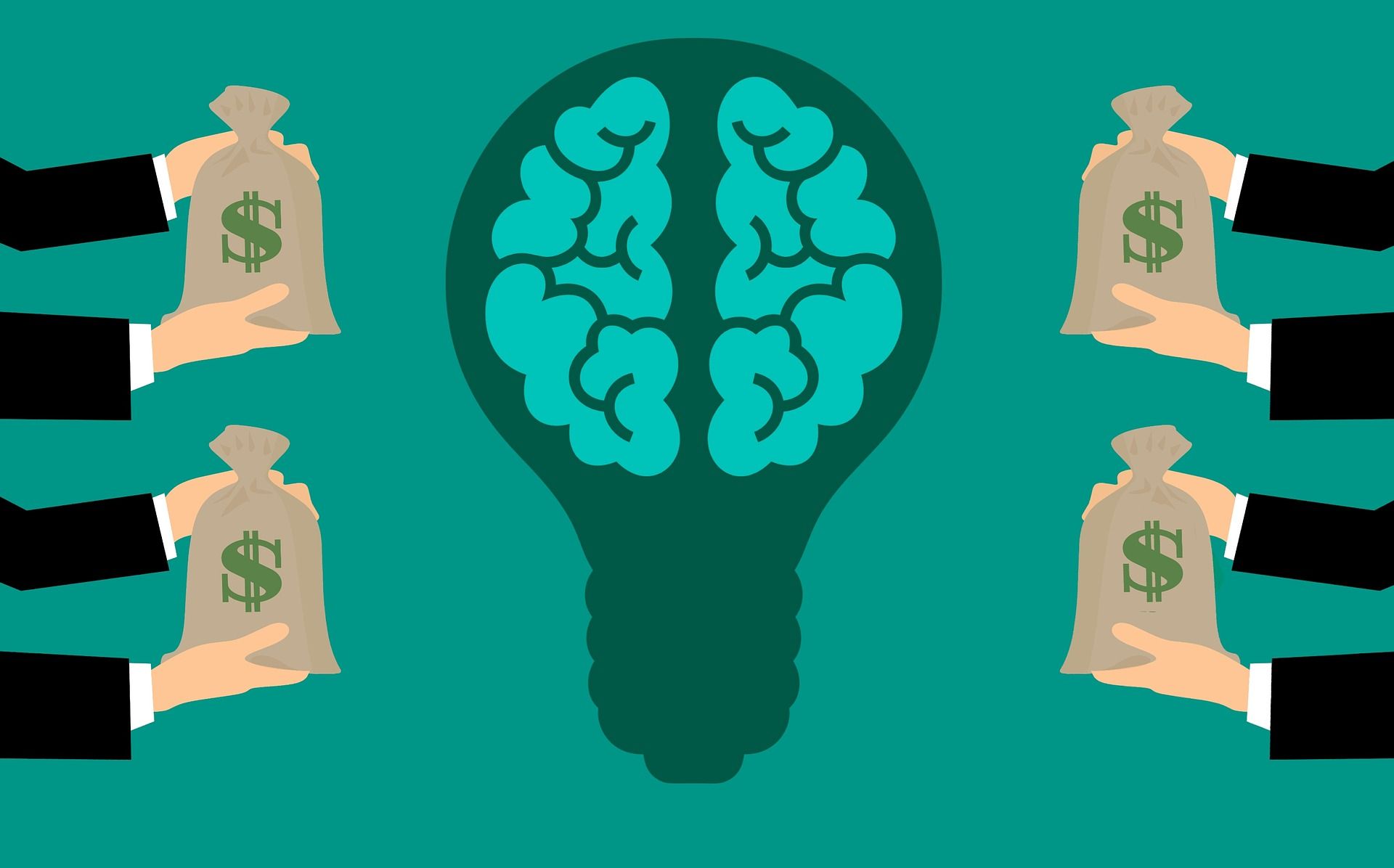Fintech, Cryptocurrency and AI is the future of Finance
Finance is going all the way digital. People want human-less operations regarding financial activities. In such a case, artificial intelligence has to play a critical role in financial automation.

AI in Finance has now become an essential part when it comes to automation and digital transformation. When you run a small business, little money runs through the market. But as your business grows, more resources and attention are required to maintain the capital flow and account handling. As technology has made our life easy, it is on its way to satisfy our financial needs. Financial Technology (Fintech) is a modern term that refers to the use of modern technology in solving any financial problem like cash flow, auditing, transaction record-keeping, and commercial finance. Broadly speaking, Fintech is any company that uses the internet, computer, smartphone or cloud network for financial operations.

Finance is going all the way digital. People want human-less operations regarding financial activities. In such a case, artificial intelligence has to play a critical role in financial automation.
The Importance of Hiring Fintech Developers for Digital Transformation
Digital transformation refers to the process of using technology to make significant changes and improvements in how a business operates. It involves adopting digital tools and systems to enhance efficiency, streamline processes, and deliver better experiences to customers. By embracing digital transformation, companies can stay competitive and meet the evolving needs of their customers in today's digital world.
To achieve successful digital transformation in the finance industry, it is essential to hire fintech developers. These professionals specialize in financial technology and have the expertise to develop innovative solutions that align with the specific requirements of financial institutions. They can integrate different systems, enhance customer experiences, and ensure that all operations comply with industry regulations and security standards. By bringing fintech developers on board, financial organizations can harness their skills to drive the digital transformation journey and stay ahead of the curve.
What areas are covered by Fintech?
Fintech is encapsulating almost all the levels of financing. From mobile banking and insurance to cryptocurrency and investment portals, Fintech is being vigorously applied. In this post we have discussed the applications of Fintech and the role of AI in executing all the operations with benefits and risks altogether.
1. Crowdfunding

Crowdfunding is a procedure in which a project or startup is funded by collecting a small amount of money from many people across the globe, usually via the internet. This practice has abrupted the traditional loan schemes that were hard to achieve and demanded heavy interest rates. Whenever a project needs funding, the word is spread through certain platforms. People respond by donation even a tiny amount of money using various currencies and money transfer platforms. In simple words, Crowdfunding is a form of crowdsourcing or alternative finance.
What companies/websites use crowdfunding?
Crowdfunding is mostly used to raise funds for startups or non-profit ventures. The top 10 crowdfunding companies are Kickstarter, Indiegogo, Patreon, GoFundMe, Crowdrise, PledgeMusic, Razoo, RocketHub, CrowdFunder, and Give (WordPress plugin).
How can AI help in crowdfunding?
The success of the Crowdfunding campaign depends upon how many funders are attracted to the campaign. It is estimated that the first 48 hours of campaign initiation are really very important. If 25% of the funds required for the project are obtained through fundraising during this period, the project is expected to be successful.
MILAAP is India’s first AI-controlled Crowdfunding system. It utilizes AI chatbots to retrieve the information from potential respondents in a conversational manner. This method is faster and the user does not have to worry about filling laborious form filling. Representatives at MILAAP claim that their campaign efficiency has increased 3 times every year after implementing AI chatbots.
Trends on social media about certain social work can be recorded using the deep web and machine learning. Patterns and scores can be noted against successful or flopped campaigns. This information can assist AI with learning progressively about premiums and empathic elements. By utilizing this information, crowdfunding campaigns can be enhanced in a much faster and detailed way.
SeedInvestis an Equity Crowdfunding agency that is using the Kylie AI platform for investment. Kylie has the ability to clone the employee’s personalities to automate the customer care process. Kylie.AI has raised $1,220,750.00 on SeedInvest.
2. Blockchain and Cryptocurrency

Blockchain is a collection of digital information distributed over a secured decentralized network, owned by no one. In other words it is a distributed public ledger. Say it is a public property and no single person or firm has right to claim its ownership. Each node/computer on Blockchain has complete information stored. Even if few computers are compromised, data will not be lost. The cryptocurrencies like Bitcoin and Ethereum are based on Blockchain.
How AI can help in Blockchain and cryptocurrencies?
The amalgamation of AI with blockchain can open new insights about the security and effectiveness of blockchain management. Although examples of their merger are sparse, yet both can make a huge difference if put on the table together.
The most sensitive aspect of Blockchain is security. Though this system is highly secured, it is still prone to hacker’s attacks to compromise data privacy. The data is encrypted using encryption keys that allow the key holder to access the data. The convolution neural networks can establish a threshold to allow certain key entries to reach the data throughout the network nodes, providing unshakeable data security.
Researchers are developing AI predictive algorithms for effective and fruitful blockchain investment. These algorithms will use information spread across the digital world in the form of social media feeds, business trends, currency migration, and online shopping trends. Such predictive models will speedup and orchestrate the blockchain process.
What is missing in the cryptocurrency world?
One thing is still missing in the blockchain world, i.e. common platform for all cryptocurrencies. Ethereum based cryptocurrencies are not easily converted into Bitcoin. The world needs an agreement to share every type of cryptocurrency at one unitary platform (must be decentralized though).
3. Mobile Payments

Mobile phones have replaced many gadgets in daily life like calendar, stopwatch, wristwatch or even wall clocks, notepads, TV, radio, and many other things. There is now a huge trend of digital money and people want to be wallet free as well. Mobile payments have brought this dream into reality.
Mobile payment accounts are your walking banks. Like other banks, these need security and swiftness of transactions as well. Since mobile transaction data is huge, this can incorporate undeniable AI intervention into mobile or online banking.
How can AI help in Mobile payments?
Since artificial intelligence is mostly based on experience data, mobile transactions can be supported in various ways. Some of the parameters are discussed here.
- KYC (know Your Customer)
- Improved customer services
- Changing the way people invest
- Predicting borrower bankruptcy
- Get real-time authorization of transactions
All the transactions are being recorded by the service provider. When AI is deployed, it can track and record the user’s interest and spending behavior. When, what and how customers buy certain things. This all can predict future spending and trends in online shopping. How can this help in real? Well! Service providers can improve their services by knowing 1. Where and what kind of problem customers faced during the transaction. 2. What is the most preferred payment method for the customer? 3. How to automate and speed up the payment process.
For the above-mentioned purposes, The Bank of America has designed its own AI-supported android chatbot named Erica. The main features Erica includes are:
- FICO score Insights for credit score changes
- Refund confirmation alert
- Receive bill reminders
- Dispute a charge
- Live balance watch
- Home equity line of credit notifications
- Spend Path for expenditure tracking
- Monitor Recurring charges if paid more than usual
4. Insurance

Insurance is one of the most important social services in developed countries. Since it is old and highly regulated, it has not adopted modern technology according to modern trends. There is still a lot of paperwork involved in the execution of insurance claims. This situation has created slow processing and a higher ratio of disputes between consumers and insurance agencies. If all these functions become automated, think how much easy life would become.
How can AI help with insurance?
a) Pricing and marketing
There are certain rules for pricing insurance policies. These depend upon situation and package of insurance. Health, risk, money insurances have different packages and incentives. Using Machine Learning approaches, all process of pricing can be automated so that rule-based decisions are made quickly and there can be less dispute about charges.
b) Fraud Detection
All human activities are monitored at a certain level, either by security agencies or social media and search engines. There is uncountable data available about certain people in an area. By integrating all the social data and insurance policy records, falsified claims can be minimized to zero corruption.
c) Operations
Automatic chatbots can respond to consumers in a more efficient and user-friendly way. When chatbots are backed up by huge data about customers, it can respond better and answer the questions more accurately.
Insurance companies are using AI?
a) AI for Medical Insurance
Disease variation and complexities are increasing day by day. So the medical data is. Accolade Inc’s Maya Intelligence platform utilizes machine learning to organize patient’s data. This helps patients and employers select the most relevant and cost-effective health insurance packages. Accolade has data of more than 1.1 million clients.
Similarly, a British firm Kirontech claims that its software KironMed uses machine learning to analyze medical claims and detect patterns to eliminate health insurance fraud or underutilization. The company has a capital of $3.5 million in Series A funding.
b) AI for Auto Insurance
Ant Financial Is a fintech company for Alibabagroup. Ant Financial has launched a software named Ding Sun Bao (means fixed damage package) using machine vision. After the accident, DingSunBao allows drivers to take pictures of the spot using their smartphones and this program compares the damage with store image data to analyze the damage cost. This technique readily identifies insurance coverage.
Where we are heading from here?
While advancements in the area of FinTech have been happening at lightning speed, we have only just begun to scratch the surface of what is possible and likely to happen in the next few years. It is no exaggeration to say that FinTech is literally changing our lives and habits by making it easy to trade, bank, and exchange money without the need for physical human interaction. However, the financial sector has a few challenges to overcome, especially in the regulatory and data protection space, to win consumer trust and for FinTech to truly overtake the market. With big data, blockchain, AI and so many other tech advances already in use or on the horizon, business leaders are advised to seek opportunities and adopt FinTech applications in their own business models to win tomorrow’s consumers.
Cheers :)



